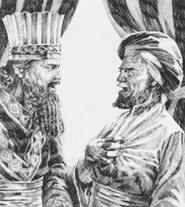The Gospels: Mark 3:13-19 – Another Lesson About Authority
Jesus went up on a mountainside and called to him those he wanted, and they came to him. He appointed twelve that they might be with him and that he might send them out to preach and to have authority to drive out demons. These are the twelve he appointed: Simon (to whom he gave the name Peter), James son of Zebedee and his brother John (to them he gave the name Boanerges, which means “sons of thunder”), Andrew, Philip, Bartholomew, Matthew, Thomas, James son of Alphaeus, Thaddaeus, Simon the Zealot and Judas Iscariot, who betrayed him.
“When the righteous are in authority, the people rejoice,” says Proverbs 29:2 (KJV).
Who has authority over you? Do you see that person as a blessing? Or as a demon?
Jesus’ idea of authority was not the same as that of the typical human. Once, when a dispute broke out among the disciples about which one of them was the greatest, Jesus told them, “The kings of the Gentiles lord it over them; and those who have authority over them are called ‘Benefactors.’ But not so with you, but let him who is the greatest among you become as the youngest, and the leader as the servant” (Luke 22:25-26, NASB).
In their wrangling about authority, the disciples were fairly representative of humanity. But Jesus taught them what authority is really all about. Used rightly, authority is a blessing to those who are under it.
In the ancient world, authority could be anything but a blessing. In fact, in every age of human history, angry and self-centered humans have misused authority as a free ticket to abuse and cruelty.
 Wherever humans have charge of other humans, there is the potential for exploitation and maltreatment. Wherever humans have charge of other humans, there is the potential for exploitation and maltreatment. |
Today, we have our share of tyrant dictators, corrupt corporate officers and law-enforcement officials, despotic bosses, and abusive spouses, parents and prison guards. Wherever humans have charge of other humans, there is the potential for exploitation and maltreatment.
“Masters,” Paul wrote, “provide your slaves with what is right and fair, because you know that you also have a Master in heaven” (Colossians 4:1). God is just and fair. That means at least two things. One is that he will be just and fair with you and me. Another is that you and I need to be just and fair too, because we belong to him.
Deliverance
When Jesus gave authority to the apostles, he gave it to them with an explicit purpose — to drive out demons. Demons were evil spirits who tortured their victims by continual oppression that led finally to taking over their wills completely. These evil spirits saw Jesus as their archenemy — and rightly so. Jesus absolutely opposed their cruelty and subjugation of humanity. One of his stated goals was to drive them out and end their tyranny. Oddly enough, the wicked spirits perceived Jesus as the tormenter, because he would not allow them to continue their oppression of humans.
“We know you are the Son of God,” some of them said. “Have you come to punish us before it’s time?” (see Matt. 8:29). The evil spirits recognized Jesus’ authority, and they knew he would not allow their illicit, gangster-style authority to stand. Jesus gave authority to the apostles to do exactly what he was doing — bringing release to the captives.
Jesus came with all the authority in the universe not to take advantage of humans or to take over the wills of humans, but to deliver. Whether we are talking about release from the cruel domination and repression exercised by evil spirits, or about any release from other forms of oppression, authority is to be used for deliverance — to make things better for those being ruled.
Authority, God style, is for the blessing and furtherance of humans. It is to nurture others, to help them develop, improve and grow. Certainly, authority must sometimes be used for discipline. Even discipline can be a form of deliverance when it is given in wisdom. A heart that is ruled by love knows the difference between correction and cruelty.
Choices
Whenever we have authority, we have choices about how we will use it. We can use it to get our own way. We can use it for revenge or retaliation. We can use it to give favors to friends or family. We can use it to dodge responsibility for our actions. None of this is what Jesus had in mind when he gave authority to the apostles.
Jesus delegated authority so that it could be used to deliver others from bondage and oppression. Like any good gift, though, we can misuse it. We can use authority to get our own way, or we can use it to see that the right thing happens — whether it benefits us or not.
Who is under your authority? Employees? Association or club members? Detainees? Applicants? Family members? Parishioners? Children? Do they view you as a blessing? Or as a demon?
Jesus comes to us with deliverance. Part of that deliverance is that he hears the cries of the oppressed. Another part is that he changes the hearts of those who oppress others. If we are suffering, we can ask our Deliverer for relief. If those under our authority see us more as devilish than as blessed, maybe it’s time to ask our Redeemer to change our hearts, too.
Author: J. Michael Feazell, 2004, 2012
